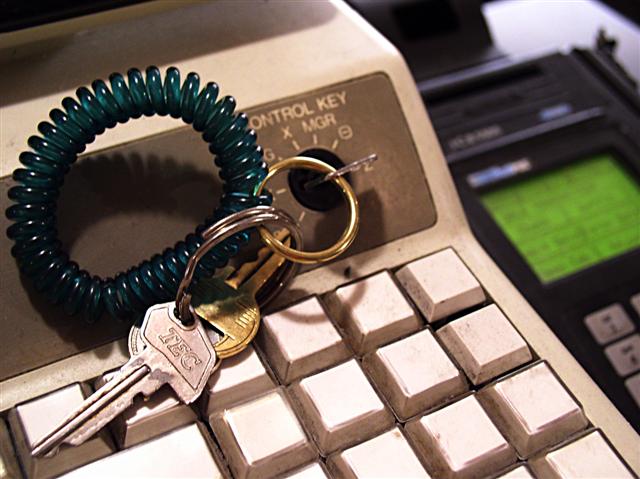 Lessees may not have as many options available to them as they did when economic times were better.
PHOTO: SHUTTERSTOCK |
By Tom Andel, contributing editorThe decision of whether to lease or buy a forklift was a lot easier when the economy was healthier. And although we may be on the verge of an economic recovery, fleet managers still have to deal with the vestiges of the recession. For example, it may be a bit easier to get credit these days, but will that credit be sufficient to meet your needs?
For this third installment of
Forkliftaction.com News's survey report on market trends, we asked forklift dealers and OEMs how they felt the lease vs buy decision was changing purchasing habits. Most of the dealers consulted are members of the Material Handling Equipment Distributors Association (MHEDA), and this has become an important discussion topic for them.
"A primary driver in the lease vs buy decision will be the availability of capital," says Jerry Weidmann, president of Wisconsin Lift Truck Corp. "During a recession and the first part of a recovery, companies seek to preserve capital and cash flow. To preserve availability of their lines of credit, companies will seek third-party lease financing. To minimise cash-flow impact, more companies will lease on an operating lease with as long a term as makes sense for their utilisation."
However, lessees may not have as many options available to them as they did when economic times were better. Tim Hilton, CEO of Carolina Handling, LLC, believes captive lessors are better equipped than banks or non-captive lenders to offer attractive terms to forklift users.
"We expect financial merchandising to be even more important for customers as the credit markets continue to impose the new and more restrictive lending criteria," he continues. However, he predicts that residuals will remain static as purchase prices "will probably not move much and this will keep residuals about the same to reflect future pricing of new equipment".
Brett Wood, president of Toyota Material Handling USA, notes that his company offers funding from its captive finance company, Toyota Financial Services (TFS). This means TFS is able to leverage its relationship with TMHU and its dealer body to remarket a customer's used equipment.
"This option may have special financing linked to the equipment, providing the customer a more competitive pricing structure," Wood says. "For small businesses, it is important that they are in a strong position with their creditors to ensure they can get favourable lending options."
For example, TFS offers sub-vented rates with TMHU, which also means a myriad of rates, based on the customer's financing goals and the amount of the loan.
Of course, the beauty of leasing has been that it allows businesses to conserve cash and other credit lines while maintaining fixed expenses throughout the life of the lease. It has also allowed lessees to keep assets off their balance sheets.
That might change, though, depending on whether the United States adopts international accounting rules that require leases to be included on balance sheets - a move which "could turn the whole idea of leasing upside down and change the way customers acquire trucks", notes Jim Moran, senior vice president of Crown Equipment Corp. "For example, they may switch to some kind of rental agreement to keep the asset off the balance sheet. An operating lease might not even exist any more in a historical sense. I'm not convinced we'll end up there, but it's creeping along."
If those changes do happen, Jim Malvaso, president and CEO of The Raymond Corporation, doesn't believe fair market value (FMV) leases will be much better than a fully disclosed lease.
"The FMV lease will still be the best option for the cash flow and use vs ownership," he says, "but with the interest rate low, the normal FMV lease is harder to compare to straight finance or a full payout lease. I think interest rates will increase, starting in 2011, and with this, FMV leasing will become more favourable."
Many of the respondents to
Forkliftaction.com News's survey predict that leasing periods will get longer. Part of the reason for that is that forklifts are more durable than ever. Moran says even OEMs like Crown often recommend extending leases from the standard five years to seven.
Dave Griffith, president and CEO of Modern Group Ltd. in Bristol, PA, even sees potential for longer term rentals. But Bill Rowan, president of Sunbelt Industrial Trucks, points out that the beauty of leasing is that it can even favour those who don't use forklifts all that much.
"If you are only paying for the utilisation, you can reduce your monthly payments and your hourly costs significantly," he says. "If you anticipate low usage, your rates will reflect that, with the opportunity to pay for additional utilisation down the road."
Kenneth M. MacDonald, president of M&G Materials Handling Co. in East Providence, RI, says leasing is an important strategy when economic times make capital more difficult to acquire.
"Customers must have liquidity to operate their plants and will commit to leasing in order to keep their financial lending institutions comfortable with them," he concludes.
However, Bruce Pelynio, president and CEO of Memphis-based Heli Americas, predicts poor capital availability will restrict the ability to lease at will as companies used to do.
"The lack of availability of easy leasing terms is going to have people looking at buying equipment, and they won't be turning it every four years," he says. "People will want to come back to buying a basic lift truck that they can service in house. They'll want to use their own employees."
- Next week, Part 4 in Forkliftaction.com News's survey report examines the role forklifts play in reducing a company's carbon footprint.